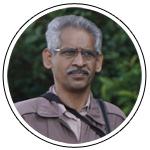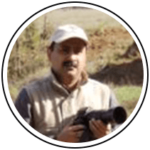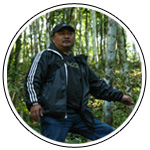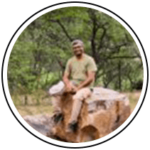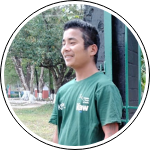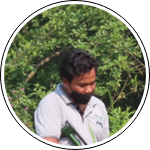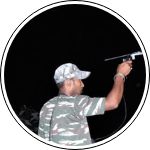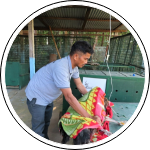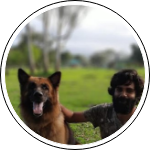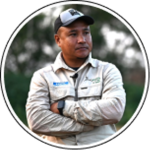OUR TEAM
It takes a Team of Believers

What began as a three-member team in a small room in south Delhi in 1998, is today a family of over 200 professionals from diverse backgrounds – conservation biologists, scientists, sociologists, wildlife veterinarians, managers, lawyers, finance experts and communication specialists – but committed to the common cause of wildlife.
They are based in any of the 15 field stations in remote parts of the country and a central coordinating office in the national capital region. An Executive Management Team comprising experienced conservationists, scientists and managers provide visionary leadership to the vibrant and enthusiastic WTI team. The Board of Trustees of WTI comprises stalwarts who bring together a collective experience of many decades in the field of conservation, education and management.


Late Mr Ashok Kumar
Founder and Chairman Emeritus
Ashok Kumar, Founder and Chairman Emeritus of the Wildlife Trust of India, passed away on August 18, 2016, at the age of 81. It is not often that the term can be used without hyperbole, but Ashok Kumar was a legend. He made several game-changing contributions, particularly in the battle against the illegal trade in wildlife and its derivatives, during the course of a conservation career spanning five decades. Along the way there were many milestones: organisations built and enriched, criminals apprehended and prosecuted, habitats protected, and wild lives saved.
Read More
Perhaps his love for wildlife took root in the days of his youth when he walked the Himalayan foothills of Dudhwa National Park. A conservation consciousness, he himself declared, developed when he was working with Tata Steel in east India, travelling often through the region, passing “through the forest after forest” as he said in an interview with Sanctuary Asia. “I used to visit Simlipal often, and those forests with their elephants had me totally captivated.”
While still with Tata Steel he began lobbying and working for the creation of Dalma Wildlife Sanctuary near Jamshedpur, which was so notified in 1975 largely due to his determined efforts. A ten-year corporate stint in the Middle East followed, but even there, in his own words, he “began to look for ways in which to get involved with wildlife.” He helped establish the Dubai Natural History Society and, having discovered Dubai to be a major international hub for wildlife products, began the battle that would be his defining crusade in years to come.
He joined WWF India in 1990 with the express purpose of setting up an organisation, the country’s first, to investigate the illegal wildlife trade. This initiative led to the creation of the Wildlife Trade Monitoring Unit, which evolved into TRAFFIC India a year later. A slew of investigations and seizures turned the national spotlight on traders in fur, bones and ivory, who were operating with impunity at the time. One particular raid in Majnu-ka-Tila in New Delhi, still the largest-ever seizure of tiger bones in India, revealed for the first time the international demand not just for tiger skins but bones and precipitated the national tiger crisis that has had repercussions in terms of enhanced protection of tigers and their habitats to this day.
He was a consultant to the Ministry of Environment and Forests (MoEF) between 1992 and 1997, and Member Secretary of the Supreme Court-appointed Subramanium Committee that prepared the basic document on control of illegal wildlife trade in India, one of the chief recommendations of which was to create a National Wildlife Crime Control Bureau. He represented India at CITES delegations for over 25 years, helped found the inter-governmental Global Tiger Forum and served on the Steering Committee of Project Tiger and the National Coordination Committee for Prevention of Wildlife Crimes. He was also a member of the IUCN’s Cat Specialist Group and Asian Elephant Specialist Group. In 1998 he helped set up the Wildlife Trust of India, an organisation he would nurture and mould for the next 18 years.
Through all this, he remained the quintessential man of action, always on the frontlines. He was the sethji, the unscrupulous buyer of illegal wildlife goods, in countless covert operations, playing a very direct (and often dangerous) part in the arrest of poachers, traders and middlemen. He led investigations that resulted in massive seizures of tiger and leopard derivatives, bear bile, and even products such as shahtoosh shawls and mongoose hair brushes, drawing attention to the plight of ‘lesser known’ species and virtually unknown facets of the wildlife trade.
While he was not a trained lawyer he specialised in Wildlife Law at the policy and practice level. He was something of a serial litigator, filing PIL after PIL to ensure that people involved with and issues related to the illegal wildlife trade were placed squarely in the spotlight. He fought and won several noteworthy cases – be it saving the wetlands in UP from a World Bank-funded construction project, procuring orders to move an irrigation colony out of Corbett NP, or keeping the infamous poacher and wildlife trade kingpin Sansar Chand behind bars – and even argued some cases personally in the Delhi High Court.
He came to be known among conservationists as the father of wildlife crime control in India. Indeed, it is said that the term ‘wildlife crime’ would not have existed in the country but for his efforts.
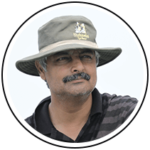
Vivek Menon
Founder, Trustee and Executive Director
Vivek Menon is a wildlife conservationist, environmental commentator, author and photographer with a passion for elephants. He has been part of the founding of five environmental & nature conservation organisations in India. The winner of the 2001 Rufford Award for International Conservation for his work to save the Asian elephant, Menon is the Founder and Executive Director of the Wildlife Trust of India as well as Senior Advisor to the International Fund for Animal Welfare.
Read More
In India, he plays a role in advising the government on natural heritage conservation as a part of several committees including the Project Elephant Steering Committee, National Wildlife Action Plan Committee, CITES Advisory Committee and the Governing Council of the Central Zoo Authority. He is a member of four State Advisory Boards for Wildlife and an Honorary Wildlife Warden of Delhi. In the interphase between business and Biodiversity, he is the Co-Chair of Leaders for Nature, IUCN and an Advisory Council Member of the CII-ITC Centre of Excellence for Sustainable Development.
Internationally, he is the Chairperson of the IUCN SSC Asian Elephant Specialist Group and a member of the Species Survival Commission of the IUCN, on the International Jury of the Future for Nature Awards (Netherlands) and an Advisor of the Marjan Centre of Kings College, London. In the past, he has served as a consultant to the Kenya Wildlife Services and helped establish the first elephant reserve of Myanmar. He has trained wildlife officers of over fifty countries in wildlife crime prevention and has attended CITES meetings for over twenty years as a Technical Advisor to the Indian delegation and as an observer.
He is also the author or editor of ten wildlife books including the recently published Secret Lives of Indian Mammals (for children), the bestselling Indian Mammals: A Field Guide, scores of technical reports and more than 150 articles in various scientific and popular publications.
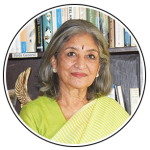
Tara Gandhi
Founder and Life Trustee
Tara Gandhi worked for the biodiversity conservation programmes of several national and international organisations: Commonwealth Secretariat, London, MS Swaminathan Research Foundation, WWF and National Biodiversity Authority, also serving on committees of BNHS-India, Sάlim Ali Centre for Conservation & Ornithology, Madras Naturalists’ Society, and the Institutional Ethics Committee of the Indian Institute of Technology (IIT-M). She conducted extensive status studies of Protected Areas all over India, including in the Andaman & Nicobar and Lakshadweep islands. The author of books as well as scientific and popular articles on birds and ecology, she is engaged in ornithological and wildlife surveys and works with volunteers for nature conservation.

Thomas Mathew
Founder
Mr Thomas Mathew co-founded WTI in 1998 and served as the Chairman of the Board until 2005. Qualified as a biochemical engineer and environmental scientist with a Bachelor of Technology degree in Chemical Engineering from IIT Kanpur and a Master’s degree in Bio-Chemical Engineering from Rutgers University, New Jersey, USA, Mr Mathew has over three decades of professional experience in conservation planning and environmental management. Prior to founding WTI, he served as Secretary General and CEO of WWF India and as Director of Conservation in the Asia Programme of WWF USA. Mr Mathew has been a consultant to the World Bank, the Global Environmental Facility, UNEP and UNIDO. Mr Mathew was appointed Officer of the Order of the Golden Ark in 1994, by HRH Prince Bernhard of The Netherlands in recognition of his services to international conservation. In 1998 Mr Mathew was awarded a Certificate of Merit by the United States Fish and Wildlife Service for his contributions to conservation.

EMERITUS BOARD

Late Mr Ashok Kumar
Founder and Emeritus member of the Board
Ashok Kumar, Founder and Chairman Emeritus of the Wildlife Trust of India, passed away on August 18, 2016 at the age of 81. It is not often that the term can be used without hyperbole, but Ashok Kumar was a legend. He made several game-changing contributions, particularly in the battle against the illegal trade in wildlife and its derivatives, during the course of a conservation career spanning five decades. Along the way there were many milestones: organisations built and enriched, criminals apprehended and prosecuted, habitats protected, wild lives saved.
Read More
Perhaps his love for wildlife took root in the days of his youth, when he walked the Himalayan foothills of Dudhwa National Park. A conservation consciousness, he himself declared, developed when he was working with Tata Steel in east India, travelling often through the region, passing “through forest after forest” as he said in an interview to Sanctuary Asia. “I used to visit Simlipal often, and those forests with their elephants had me totally captivated.”
While still with Tata Steel he began lobbying and working for the creation of Dalma Wildlife Sanctuary near Jamshedpur, which was so notified in 1975 largely due to his determined efforts. A ten-year corporate stint in the Middle East followed, but even there, in his own words, he “began to look for ways in which to get involved with wildlife.” He helped establish the Dubai Natural History Society and, having discovered Dubai to be a major international hub for wildlife products, began the battle that would be his defining crusade in years to come.
He joined WWF India in 1990 with the express purpose of setting up an organisation, the country’s first, to investigate the illegal wildlife trade. Thus was born the Wildlife Trade Monitoring Unit, which a year later became TRAFFIC India. A slew of investigations and seizures turned the national spotlight on traders in fur, bones and ivory, who were operating with impunity at the time. One particular raid in Majnu-ka-Tila in New Delhi, still the largest-ever seizure of tiger bones in India, revealed for the first time the international demand not just for tiger skins but bones, and precipitated the national tiger crisis that has had repercussions in terms of enhanced protection of tigers and their habitats to this day.
He was a consultant to the Ministry of Environment and Forests (MoEF) between 1992 and 1997, and Member Secretary of the Supreme Court-appointed Subramanium Committee that prepared the basic document on control of illegal wildlife trade in India, one of the chief recommendations of which was to create a National Wildlife Crime Control Bureau. He represented India at CITES delegations for over 25 years, helped found the inter-governmental Global Tiger Forum, and served on the Steering Committee of Project Tiger and the National Co-ordination Committee for Prevention of Wildlife Crimes. He was also a member of the IUCN’s Cat Specialist Group and Asian Elephant Specialist Group. In 1998 he helped set up the Wildlife Trust of India, an organisation he would nurture and mould for the next 18 years.
Through all this he remained the quintessential man of action, always on the frontlines. He was the sethji, the unscrupulous buyer of illegal wildlife goods, in countless covert operations, playing a very direct (and often dangerous) part in the arrest of poachers, traders and middlemen. He led investigations that resulted in massive seizures of tiger and leopard derivatives, bear bile, and even products such as shahtoosh shawls and mongoose hair brushes, drawing attention to the plight of ‘lesser known’ species and virtually unknown facets of the wildlife trade.
While he was not a trained lawyer he specialised in Wildlife Law at the policy and practice level. He was something of a serial litigator, filing PIL after PIL to ensure that people involved with and issues related to the illegal wildlife trade were placed squarely in the spotlight. He fought and won several noteworthy cases – be it saving the wetlands in UP from a World Bank funded construction project, procuring orders to move an irrigation colony out of Corbett NP, or keeping the infamous poacher and wildlife trade kingpin Sansar Chand behind bars – and even argued some cases personally in the Delhi High Court.
He came to be known among conservationists as the father of wildlife crime control in India. Indeed, it is said that the term ‘wildlife crime’ would not have existed in the country but for his efforts.

Dr. M K Ranjitsinh
Chairman Emeritus
For the last half a century, Dr MK Ranjitsinh has been at the forefront of shaping conservation strategies for not only the flagship species but also for key habitats in India. One of his greatest contributions to wildlife conservation was the framing of the Wildlife (Protection) Act, 1972, which laid the foundation for India’s wildlife movement. He was the Member Secretary of the task force that put together Project Tiger.
Read More
His other significant achievements have been the key role he played in the first-ever successful relocation of a village from inside a Protected Area, notification of over eight national parks and 11 wildlife sanctuaries and also the successful captive breeding and release programmes for all three species of Indian crocodilians.

Ajay Balram
Emeritus Member of the Board and Honorary Treasurer
Mr Ajay Balram is a business manager who was formerly Managing Director of Tate & Lyle Investments (India) Pvt Ltd. Having spent many years in the industry, he brings vast expertise in management and finance to WTI. Mr Balram is also an Olympic judge in yachting and a well-known theatre personality in Delhi. He represented South & Central Asia on the Council of the International Sailing Federation (the apex body for the sport of sailing) for eight years and was awarded the ISAF Silver Medal for ‘Services to the Sport of Sailing’. He has had a long-term interest in wildlife conservation.

Dr. Parimal C Bhattacharjee
Emeritus Member of the Board
PC Bhattacharjee is a respected academic and a retired Professor of Gauhati University. He pioneered wetland studies, primatology and biodiversity studies in north-east India. He is a member of several governmental and state committees on wildlife conservation including the National Biodiversity Authority (NBA), State Biodiversity Board (Assam), State Wildlife Board (Assam) and the Regional Empowered Committee (North East), MoEFCC, GoI.
Read More
He has also served as the Director (Research Advisory Council), Vivekananda Kendra Institute of Culture and as a Visitor’s Nominee to Pondicherry University and Assam University (Silchar). He is also an erstwhile state level cricket player and was a member of the state Ranji Trophy selection committee. He has also served as the Director (Research Advisory Council), Vivekananda Kendra Institute of Culture and as a Visitor’s Nominee to Pondicherry University and Assam University (Silchar). He is also an erstwhile state-level cricket player and was a member of the state Ranji Trophy selection committee.

Dr. Erach Bharucha
Emeritus Member of the Board
Dr. Erach Bharucha is the Director of Bharati Vidyapeeth Institute of Environmental Education and Research (BVIEER), Pune. He has been engaged in implementing a variety of environmental education programs for schools, colleges, and the public at large. Dr. Bharucha is a well-known wildlife photographer, he has travelled and studied Indian National Parks and Wildlife Sanctuaries extensively over the last three decades. He has also written several academic and non-academic books; Living Bridges: Folk Cultures of India, Then and Now; The Biodiversity of India; and Wonders of the Indian Wilderness are some of his notable works.
Read More
He has been a member and executive of such conservation institutions as the Bombay Natural History Society, Worldwide Fund for Nature, and Wildlife Institute of India. He has also been associated with NCERT, SCERT, and UGC to further the cause of formal environmental education.
TRUSTEES

G V Prasad
Chairman
Mr G V Prasad is the Co-Chairman and Managing Director of Dr Reddy’s Laboratories Ltd. He is a Chemical Engineer from Illinois and did his Masters in Industrial Administration from Purdue University. Prasad is a Board member of institutions such as the Indian School of Business and Ashoka University. He has also previously served on the Boards of IIT Hyderabad, S V University, Cyient and Acumen Fund to name a few. He is currently the Chairman of the CII National Committee on Pharmaceuticals (2019-20) and has also previously been the Chairman of the CII National Committee on Environment and the Intellectual Property Committee (2006–2007).
Read More
G V Prasad has recently been appointed as the Honorary Consul of the Kingdom of Belgium in Hyderabad. He was declared India’s Best CEO in the Large Company category by Business Today in 2014, and India Business Leader of the Year by CNBC Asia in 2015. Spearheading Dr Reddy’s Laboratories, Mr. Prasad is engaged in strengthening Dr Reddy’s research and development capabilities, supporting progressive people practices and building a holistic culture of operational excellence. His passion for wildlife and nature conservation is known as a supporter and board member of WWF-India (AP and Telangana Chapter) and on joining the WTI Board.

Vivek Menon
Founder, Trustee and Executive Director
Vivek Menon is a wildlife conservationist, environmental commentator, author and photographer with a passion for elephants. He has been part of the founding of five environmental & nature conservation organisations in India. The winner of the 2001 Rufford Award for International Conservation for his work to save the Asian elephant, Menon is the Founder and Executive Director of the Wildlife Trust of India as well as Senior Advisor to the International Fund for Animal Welfare.
Recently he was made a Fellow of the Linnean Society of London and inducted into the Freedom of City, London by its Lord Mayor.
Read More
In India, he plays a role in advising the government on natural heritage conservation as a part of several committees including the Project Elephant Steering Committee, National Wildlife Action Plan Committee, CITES Advisory Committee and the Governing Council of the Central Zoo Authority. He is a member of four State Advisory Boards for Wildlife and an Honorary Wildlife Warden of Delhi. In the interphase between business and Biodiversity, he is the Co-Chair of Leaders for Nature, IUCN and an Advisory Council Member of the CII-ITC Centre of Excellence for Sustainable Development.
Internationally, he is the Chairperson of the IUCN SSC Asian Elephant Specialist Group and a member of the Species Survival Commission of the IUCN, on the International Jury of the Future for Nature Awards (Netherlands) and an Advisor of the Marjan Centre of Kings College, London. In the past, he has served as a consultant to the Kenya Wildlife Services and helped establish the first elephant reserve in Myanmar. He has trained wildlife officers of over fifty countries in wildlife crime prevention and has attended CITES meetings for over twenty years as a Technical Advisor to the Indian delegation and as an observer.
He is also the author or editor of ten wildlife books including the recently published Secret Lives of Indian Mammals (for children), the bestselling Indian Mammals: A Field Guide, scores of technical reports and over 250 articles in various scientific and popular publications.

Tara Gandhi
Founder and Life Trustee
Tara Gandhi worked for the biodiversity conservation programmes of several national and international organisations: Commonwealth Secretariat, London, MS Swaminathan Research Foundation, WWF and National Biodiversity Authority, also serving on committees of BNHS-India, Sάlim Ali Centre for Conservation & Ornithology, Madras Naturalists’ Society, and the Institutional Ethics Committee of the Indian Institute of Technology (IIT-M).
Read More
She conducted extensive status studies of Protected Areas all over India, including in the Andaman & Nicobar and Lakshadweep islands. The author of books as well as scientific and popular articles on birds and ecology, she is engaged in ornithological and wildlife surveys and works with volunteers for nature conservation.

Punit Lalbhai
Trustee
Mr Punit Lalbhai from Ahmedabad is the Executive Director of Arvind Ltd. He leads Arvind’s Textile manufacturing, Advanced Materials, Engineering and Agri Businesses. An MBA from INSEAD, a Bachelor’s Degree in Conservation Biology from the University of California and a Masters in Environmental Sciences from Yale University are invaluable as he spearheads their initiatives in CSR, Sustainability and Innovation at Arvind. His passion for ornithology and conservation has contributed to building sustainable businesses that have the ability to impact ecology and conservation in a positive way. Mr Punit Lalbhai brings a unique combination of youth, conservation knowledge and corporate governance to the WTI Board of Trustees.

Dr. Raman Sukumar
Trustee
Dr Raman Sukumar is well known as the elephant expert of Asia. He is a professor at the Indian Institute of Science Bangalore and has authored popular and acclaimed books on the Asian elephant. He is also an Honorary Director of the AERCC. Dr Sukumar was Chairman of the IUCN SSC Asian Elephant Specialist Group and is currently a Steering Committee member of Project Elephant, GOI. He is also a member of the National Board for Wildlife.

Dr. Mahesh Rangarajan
Trustee
Mahesh Rangarajan is an environmental historian with a special interest in human-wildlife relations in colonial and contemporary India. He chaired the Elephant Task Force in 2010. He studied at the universities of Delhi and Oxford and formerly taught at the Universities of Cornell, Delhi and Jadavpur. In 2022, he joined Ashoka University as a Professor of History and Environmental Studies.
Read More
He has been Director of the Nehru Memorial Museum and Library and also Vice-Chancellor of Krea University, AP. He is the author and editor of several books, including his 1996 work Fencing the Forest (1996) and the most recent At Nature’s Edge in 2018.

Dr. G. S. Rawat
Trustee
Dr. Gopal Singh Rawat, formerly Dean and Director at the Wildlife Institute of India Dehradun, has been actively engaged in teaching, research and academic activities for the last 40 years. His areas of specialization include eco-floristic studies in the Himalayan region, Ecology and Management of Alpine rangelands, Status survey of medicinal plants, and Wildlife Habitat Wildlife Ecology. He has Ph. D. and D. Sc. degrees in Botany from Kumaun University Nainital and recipient of the prestigious T.N. Khoshoo Memorial Award for 2019. He has over 300 publications including peer-reviewed papers, books, reports and popular articles on a wide range of topics including plant systematics, habitat ecology and management of wildlife habitats in India. He has guided more than 35 Ph. D. and 15 Masters’ students.
Read More
In the year 2004, he led an ecological expedition across the alpine region of Western Himalaya from the Indo-Nepal Border to Holy Amarnath and documented the status of alpine meadows, wildlife and high-value medicinal and aromatic plants all along. His other experiences include working as Chief Scientist, Ecosystem Services at the International Centre for Integrated Mountain Development (ICIMOD) in Kathmandu (2011-14), Member, Task Force on Mountain Ecosystems for the Planning Commission during (2006-08), Member of IUCN (SSC) Orchid and Medicinal Plant Specialist Groups and an expert member, Intergovernmental Panel on Biodiversity and Ecosystem Services for the Asia-Pacific region. Currently, he is a member of the Planning Board for Union Territory of Ladakh and a member of the expert committee for the management of Invasive Alien Species in India and Plant Conservation formed by the Ministry of Environment, Forest and Climate Change, Govt. of India. He served as a Chairman of the Committee for the formulation of the Rangeland Policy for the Union Territory of Ladakh.
Dr. Rawat is a Fellow of the National Academy of Sciences, Allahabad (2004) and a Fellow of the Linnean Society of London (2023).

Elias George
Trustee
Mr Elias George, IAS, is Chairman of KPMG’s Infrastructure, Government and Healthcare practice (IGH). He was formerly the Managing Director and Additional Chief Secretary of Transport of Kochi Metro Rail Limited and also served as its Director. As a senior IAS officer, he held positions in several departments in the State as well as in Central Ministries. He retired from the Indian Administrative Service on October 31, 2016. Mr George has also served as Official Part Time Director at Cochin Shipyard Limited representing the government of Kerala and has served on the boards of Central Government PSUs like SAIL, RINL and MSTC.

Kaushik Barua
Trustee
Kaushik Barua is a well-known entrepreneur and wildlife conservationist based in Guwahati, Assam. Besides enterprises that range from manufacturing of electromechanical goods, to supply chain logistics, construction and investments, he has founded the Assam Elephant Foundation which works towards the welfare and conservation of Asian elephants (both in-situ and ex-situ). Barua is a fourth-generation elephant owner whose love and dedication to elephants have made him a household name in the northeast.
Read More
Kaushik Barua has served Assam as an Honorary Wildlife Warden. He is a member of IUCN’s Asian Elephant Specialist Group, and Assam’s State Board for Wildlife and Elephant Task Force. Barua is a key member of the ‘Indian Rhino Vision 2.0’ Team where he is responsible for planning out translocation operations. He has collaborated with the Forest Departments of Assam and West Bengal in various rescue and radio-collaring operations involving elephants, rhinos, tigers and leopards caught in conflict situations. Barua is also involved in the training and deployment of Military Working Dogs for anti-poaching operations.


Vivek Menon
Founder, Trustee and Executive Director
Vivek Menon is a wildlife conservationist, environmental commentator, author and photographer with a passion for elephants. He has been part of the founding of five environmental & nature conservation organisations in India. The winner of the 2001 Rufford Award for International Conservation for his work to save the Asian elephant, Menon is the Founder and Executive Director of the Wildlife Trust of India as well as Senior Advisor to the International Fund for Animal Welfare.
Recently he was made a Fellow of the Linnean Society of London and inducted into the Freedom of City, London by its Lord Mayor.
Read More
In India, he plays a role in advising the government on natural heritage conservation as a part of several committees including the Project Elephant Steering Committee, National Wildlife Action Plan Committee, CITES Advisory Committee and the Governing Council of the Central Zoo Authority. He is a member of four State Advisory Boards for Wildlife and an Honorary Wildlife Warden of Delhi. In the interphase between business and Biodiversity, he is the Co-Chair of Leaders for Nature, IUCN and an Advisory Council Member of the CII-ITC Centre of Excellence for Sustainable Development.
Internationally, he is the Chairperson of the IUCN SSC Asian Elephant Specialist Group, and a member of the Species Survival Commission of the IUCN, on the International Jury of the Future for Nature Awards (Netherlands) and an Advisor of the Marjan Centre of Kings College, London. In the past, he has served as a consultant to the Kenya Wildlife Services and helped establish the first elephant reserve in Myanmar. He has trained wildlife officers of over fifty countries in wildlife crime prevention and has attended CITES meetings for over twenty years as a Technical Advisor to the Indian delegation and as an observer.
He is also the author or editor of ten wildlife books including the recently published Secret Lives of Indian Mammals (for children), the bestselling Indian Mammals: A Field Guide, scores of technical reports and more than 250 articles in various scientific and popular publications.
Jose Louies
Chief Executive Officer, Chief of Enforcement and Chief of Communications
One of the most versatile members of Wildlife Trust of India (WTI), Jose serves as the Chief Executive Officer while also leading the divisions responsible for wildlife trade control and litigation and communications.
Read More
A graduate in computer sciences, Jose started his career in a multinational company, working as a network techie. For about six years, he spent time fixing computers, crashed hard drives, dealing with network security issues and teaching how to fix computers and install networks.
However, his passion for wildlife, which was evident since his childhood, took over. Things changed for him when he rescued a baby cobra with Snehal Bhatt in Vadodara. Soon, he found himself rescuing snakes and other reptiles in and around Vadodara, working as a volunteer for GSPCA. This lasted for two years, and then, he moved to Delhi.
“As a kid, I had all kinds of pets – a mouse, birds, and occasionally baby snakes kept in glass bottles hidden behind books in my room” he recalls fondly.
“I cannot keep track of how many times I tried to explain to my mother that the baby snakes were harmless and they were to be released in the wild. Each time getting good scores in the class was rewarded with permission to keep one more pet at home (the only clause….no snakes!),” he chuckles.
In Delhi, Jose joined Wildlife SOS and started exploring various avenues of wildlife conservation. Eventually, in 2007, Jose joined WTI in the communications division. His knowledge of computers and wildlife in general, helped him grow quickly within the organisation. Soon, he was handling the Wild Aid Programme, facilitating Rapid Action Projects across the country.
Described by his colleagues, as an adrenaline junkie, Jose is not one to be bound to a desk job. He soon moved on to enforcement work to minimise poaching and trade in wildlife.
“I enjoy my work as it is round the clock, includes a lot of travel and occasional testing of nerve and wits,” he adds.
In keeping with his adventurous spirit, Jose enjoys photography and biking. He also has a keen eye for online marketing, which he leverages to support fundraising efforts for the organization.
Dr. NVK Ashraf
Vice President and Chief Veterinary Officer
Dr NVK Ashraf is the Chief Veterinary Officer and Vice President at WTI. He joined WTI in 2001 as the Coordinator of the Wild Rescue programme and became the programme’s Director in 2005. Under his leadership and supervision, for the first time in India, hand-raised rhino calves were relocated to Manas National Park from CWRC as part of IFAW-WTI’s rhino reintroduction programme. He also oversees the rehabilitation of other temporarily as well as permanently displaced animals.
Read More
He completed his Bachelor’s degree in Veterinary Science (BVSc) from Chennai in 1985. As a veterinary student, he says, his interest in comparative anatomy attracted him to wildlife.
After working for a couple of years as an Assistant Veterinary Surgeon with the State government of Tamil Nadu, he joined the Wildlife Institute of India (WII) in 1989 to do his Masters in Wildlife Science, which he asserts has been one of his most memorable moments. For another two years at WII, he was associated with several projects, the principal among them being the short-term survey he carried out on the status of the Malabar and brown palm civets.
In 1992, Dr. Ashraf joined the upcoming Coimbatore Zoological Park (CZP) where he was mainly associated with Zoo Horticulture and Zoo exhibit designing. He was instrumental in re-creating four vegetation types of Western Ghats in the zoo campus, including the tropical rain forest.
Representing WTI, he visited the Environment Public Authority (EPA) of the State of Kuwait in 2003 to help prepare a schematic design plan for a wildlife rescue centre.
His interest in zoological park management and exhibit designing once again earned him a place in IFAW’s leading five-member team commissioned for renovating the Baghdad Zoo in 2003. Here, he was primarily responsible for the re-designing of the avian and mammalian exhibits. He braved the vagaries of a war zone to help animals and believes that “no matter what one’s political ideologies are, animals caught in the midst of a conflict are innocent victims who should not be made to suffer”.
Dr. Ashraf is instrumental in the creation of IFAW-WTI’s wildlife rehabilitation centres, the Centre for Wildlife Rehabilitation & Conservation (CWRC) and Centre for Bear Rehabilitation and Conservation (CBRC), and the rehabilitation projects associated with them. These include the rescue and rehabilitation of Asiatic black bears in Pakke TR as well as in Manas NP, Hoolock gibbon in Panbari Reserve Forest, release of hand-raised elephants in Manas among others.
Of all his numerous achievements, he considers “leading a large contingent of wildlife veterinarians, here in WTI; and through them, reaching out to animals in distress in different parts of India,” as the one that he cherishes the most.
Author of a large number of scientific publications, Dr. Ashraf is a member of the Captive Breeding Specialist Group as well as the Veterinary Specialists Group of the IUCN/SSC.
AV Sathyan
CFO and Chief of Management
Sathyan, the chief of finance at WTI, is one of the organisation’s oldest members. He has the challenging responsibility of monitoring and documenting the financial flow for all WTI programs, ensuring the accuracy of those transactions. He considers WTI his home and expresses that the organisation means everything to him.
Read More
A BCom graduate from the University of Calicut in Kerala, Sathyan came to Delhi filled with dreams and ambitions for his future. “I worked as a programmer, salesman-cum-cashier, photographer, and agriculturist in different organisations before joining WTI”, he says.
He started as a secretary to WTI’s Executive Director Mr. Vivek Menon and over the years, he has evolved into one of the most senior and trusted members of the staff.
Alongside his dedication to work, which consumes much of his time, he loves to unwind by watching cricket and a variety of sports on television.
Dr. Sandeep Kumar Tiwari
Vice President and Chief of Conservation
A wildlife biologist and conservationist, Dr Sandeep Kr Tiwari has been working on wildlife research and conservation for over two decades. He had previously worked as Program Manager of the IUCN SSC Asian Elephant Specialist Group and as Deputy Director and Head – Wild Lands, Wildlife Trust of India (2002-2016). He holds a Master’s Degree in Zoology and a PhD in elephant ecology and behaviour.
Read More
He headed the team for the ground-truthing and securing of elephant corridors throughout India for over 16 years and co-authored the book that brings together, for the first time, a comprehensive list of elephant corridors across India. His areas of expertise include wildlife corridors (especially elephant corridors), human-elephant conflict mitigation, habitat restoration and policy. He is a member of the IUCN SSC Asian Elephant Specialist Group, IUCN World Commission on Protected Areas, IUCN WCPA Connectivity Conservation Network, IUCN WCPA Protected Landscapes Seascapes network, IUCN WCPA-SSC Biodiversity and Protected Areas network and Conservation Advisor for Elephant Family. He was earlier associated with the Zoological Survey of India for over seven years as a researcher. He has authored five books and several scientific publications and reports. He also holds a doctoral degree in alternate medicine.
Dr. Rathin Barman
Joint Director & Chief Strategy and Liaison (North-East)
A wildlife biologist by training, Dr. Rathin Barman has been associated with the Wildlife Trust of India since 2001. He joined as a manager and has been instrumental in the organisation’s growth in the Northeast and is currently serving as a Joint Director and Chief, Strategy and Liaison (North-East).
Read More
Dr. Barman is an alumnus of Gauhati University. He did post-graduation in zoology with specialisation in animal ecology and wildlife biology. In 1998, he was awarded a doctorate for his research on “An ecological analysis of the wetlands in relation to waterbird diversity of Brahmaputra Valley, Assam”.
He has undergone a special training in Conservation and Management of Wildlife from Smithsonian Institution, US, organised by Wildlife Institute of India (WII) in 1994 and trained in Environment Education by the North American Association of Environmental Education in 1997. He also holds a Durell Endangered Species Management Graduate certificate.
Since the early 1990s, Dr. Barman has been associated with a number of diverse projects in his home state of Assam and other Northeast states. He has implemented surveys of birds, studies and projects on human-elephant conflict mitigation, awareness campaigns, policy formulation and community-based conservation projects, in collaboration with agencies and institutions including Gauhati University, WII, and other local and international NGOs.
At WTI, he works with a team of wildlife biologists on diverse projects including elephant corridor securement, human-animal conflict mitigation, and wildlife rehabilitation.
He is also in charge of WTI’s Rhino Reintroduction Project which has successfully rehabilitated three handraised rhinos in Manas National Park since 2005, initiating the reintroduction of the species in the protected area that lost all of its 100-odd rhinos by the early 2000s. Additionally, he coordinates the Elephant Reintegration Project in Manas and the Wild Buffalo Rehabilitation Project in Dibru-Saikhowa National Park.
“One of the projects that’s closest to my heart is reintroduction of rhinos in Manas. In 2006, the project began relocating handraised rhinos from CWRC. Releasing these rhinos in the wilderness was one of the most satisfying moments of my life,” recalls Dr. Barman.
Dr. Barman and Dr. Bhaskar Choudhury, were instrumental in establishing the Centre for Wildlife Rehabiltation and Conservation (CWRC) near Kaziranga National Park– India’s first wildlife rehabilitation centre near a protected area. He oversaw the site selection, acquisition of requisite permits, and construction of the centre. He served as its first manager for five years, starting in 2002. CWRC is a joint venture of the Assam Forest Department and International Fund for Animal Welfare – Wildlife Trust of India.
He has authored/co-authored a large number of scientific papers and publications over the years. “Wildlife was a new field when we started out. During the final year of my MSc, a few friends and I decided that we wanted to do something different. We started reading and discussing wildlife issues, learnt birdwatching, and so it went. All of us are now established in this field,” recollects Dr. Barman.
Known for his liaisoning skills, he plays a key role for WTI in Assam. Many of his junior colleagues express that they have greatly benefited from his leadership. Others praise his punctuality, meticulous planning, hard work, anticipation and prevention of crises, persuasiveness, and knack for getting things done effectively.
He is a member of the IUCN SSC Asian rhino specialist group and threatened waterfowl specialist group. In his free time, he enjoys photography and painting, and he is also an accomplished badminton player.
Dr. Samir Kumar Sinha
Chief Ecologist
Dr. Samir Kumar Sinha has been with the Wildlife Trust of India since 2003, currently serving as the Chief Ecologist.
His areas of interest are Protected Area Management Planning; Participatory Conservation of Natural Ecosystems; River, Forest, and Grassland Ecosystems; species recovery through ex-situ and in-situ linkage, and landscape governance for nature and biodiversity conservation.
Read More
With his broad experience and interest, he has successfully planned, implemented, and monitored conservation action projects in Species Recovery and Protected Area Recovery Projects of WTI. He initiated a few of the successful projects of WTI, such as the Valmiki Tiger Reserve Recovery Project and Gharial Recovery Project in the Gandak River in Bihar, and Sarus and wetland conservation in eastern Uttar Pradesh. Prior to WTI, he worked with Patna University on projects on the Ganga River Pollution Monitoring and Ecology and behavior of Ganges River Dolphins in Bihar.
He was awarded a fellowship under the Netherlands Fellowship Program by Wageningen University, the Netherlands and the Centre for International Forestry Research (CIFOR), Bogor, Indonesia.
In India, with his wide-ranging expertise, he advises the Central and State governments on natural heritage conservation. He was an Expert Member of the National Governing Council, Green India Mission Government of India, and a Member of, Bihar State Board for Wildlife. He has been involved in tiger conservation projects of WTI and being a part of an expert committees constituted by the National Tiger Conservation Authority to evaluate Tiger reserves in the country he also helped the government in the country’s endeavor of tiger conservation.
He is a Member of the World Commission on Protected Areas (WCPA), Commission on Ecosystem Management (CEM) and Species Survival Commission (Crocodile Specialist Group) of the International Union for Nature Conservation (IUCN).
He writes articles in leading newspapers, periodicals, web publications, and scientific journals on the environment, biodiversity, and wildlife conservation.
Sunil Kyarong
Joint Director & State Facilitator (North-east)
Sunil Kyarong holds a degree in Zoology and has 25 years of experience in wildlife and landscape conservation in Northeast India. He focuses on integrating traditional tribal conservation practices with the present science and reality. His aim is to build a strong and effective community conservation model in the tribal areas of the region. In his spare time, Sunil enjoys engaging in adventure sports and games.
Sahil Mukesh Choksi
Joint Director & Head- Development (National)
Sahil was introduced to wildlife and forests at a young age, which sparked his early involvement in snake rescues and awareness campaigns. His passion for biodiversity grew so strong that he chose to leave his 17-year corporate career to focus entirely on conservation. Over the years, he became captivated by wildlife behavior, dedicating 13 years to observing a pride of lions in Sasan Gir, Gujarat. In his free time, Sahil enjoys exploring the beauty of nature in the woods with his son, sharing his love for the outdoors.
Read More
As he fondly puts it, “humanity is being urged to elevate its consciousness and aspire to a higher moral standard… That moment is now.” A passionate birder and keen photographer, Sahil leads the Development division at Wildlife Trust of India. He and his team work diligently to secure funding for projects, ensure their smooth execution, and keep supporters informed in a timely manner.
Dr. Rajendra Prasad Mishra
Deputy Director & Regional Facilitator for Central India
Dr. Rajendra Prasad Mishra has been with the Wildlife Trust of India since 2005 and currently serves as the Deputy Director & Regional Facilitator for Central India. He earned his PhD in 2001 with a focus on the Wild Buffalo, the state animal of Chhattisgarh.
His areas of interest are Wildlife Conservation & Management, Sustainable Forest Management (SFM), Plant taxonomy, Sustainable Harvesting, Value Addition & management of NTFPs and medicinal Plants; Biodiversity conservation and management, especially for People Biodiversity Register (PBR).
Read More
He is the author/co-author of 12 books, 7 Workshop proceedings, 18 Technical reports, 32 National & International Research papers, 25 popular articles and several articles for newspapers.
Dr. Mishra is a Member of the IUCN Species Survival Commission (Wild Cattle Specialist Group). He was a member of expert committees constituted by the National Tiger Conservation Authority for Urgent Appraisal of Tiger Reserves and monitoring of village relocation in India. He is also a Member of the Expert Committee, Chhattisgarh State Biodiversity Board, Member of the Chhattisgarh State Tiger Conservation Foundation and several other committees of the state.
He was awarded the Chhattisgarh State Wildlife Conservation Award in 2020 and Chhattisgarh State Biodiversity Conservation Award in 2022.
Dr. Bhaskar Choudhury
Deputy Director & Project Head CWRC
Dr. Bhaskar Choudhury is a veterinary surgeon with over twenty-three years of hands-on experience in wildlife rescue, rehabilitation, and health management, primarily in Northeast India and other diverse regions across India. He joined WTI in 2000 and currently holds the position of Deputy Director and Project Head at the Centre for Wildlife Rehabilitation and Conservation (CWRC).
Read More
At WTI, Dr. Bhaskar has played a pivotal role in the rehabilitation and post-release monitoring of rescued Asian elephants and Indian rhinoceroses from 2007 to 2020. He also oversaw the translocation of Eastern Swamp deer from Kaziranga National Park to Manas Tiger Reserve in 2014 and 2017. In 2020, he played a crucial role in planning, field coordination, capture, and the translocation of Asiatic wild buffaloes from Assam to Chhattisgarh.
Additionally, he has served as a consultant, providing practical training to forest officers and veterinarians from Cambodia and Vietnam for WWF India on a project focused on chemical capture and radio telemetry studies of Asian elephants, which took place from May 2019 to March 2022. Dr. Bhaskar has also authored several scientific research publications.
Dr. Ishwar Narayanan
Sr. Director and Chief of Development
Dr. Ishwar Narayanan has nearly 20 years of experience in managing conservation projects and programmes with an interest in developing Species Conservation Strategies, Coastal and Marine Biodiversity Conservation, Forest Landscape Restoration, and partnering with the private sector on the above. He was awarded his Doctoral Degree in 2002 for his research on the Impact of rainforest fragmentation on reptilian communities in the rainforests of the Western Ghats. Dr. Ishwar and his colleagues were credited with the rediscovery or discovery of several species of herpetofauna including the Orange Lipped forest lizard (Microauris aurantolabium), Malabar Black Narrow Mouthed Frog (Melanobatrachus indicus) among others.
Read More
He currently serves as Sr. Director and Chief of Development. Since 2005, he has worked with international agencies like UNDP and IUCN, leading projects in India and supporting initiatives across South Asia. These projects encompassed species conservation, forest landscape restoration, economic valuation of vultures, mangrove conservation and restoration, and addressing illegal wildlife trade.


Aftab Ahmed
Assistant Manager
White Winged Duck Project

Amitabha Choudhury
Programme Officer
Admin & IT
Amrit Govinda Menon
Manager & Head
Wild Aid & Executive Offices
Anson Philip
Manager
Finance
Antony Ngorang
Animal Keeper
Project Pakke, Wild Rescue
Arshad Hussain
Manager
Sarus Habitat Securement Project, Wild Lands
Bloch Farukhkha Husenkha
Manager
Whale Shark Conservation – Veraval (Gujrat) & Mithapur Coral Recovery
Daoharu Baro
Assistant Manager
Greater Manas Recovery
Debojit Saikia
Senior Animal Keeper
CWRC
Debobroto Sircar
Manager
WCCD, Enforcement & Law
Deepankar Barman
Field Officer
D’ering Dibru Saikhowa Elephant Link Project
Doluk Dagang
Senior Animal Keeper
Project Pakke
Jeetendra Kumar Jakhmola
Programme Officer
Wild Aid/Admin, Admin
Kalpana Gupta
Assistant Manager
HR
Kaushik Deb
Assistant Manager
Greater Manas Recovery
Keshab Pathak
Animal Keeper
Greater Manas Recovery
Madhumay Mallik
Assistant Manager
Communications
Mahendra Bhojram Raut
Senior Field Officer
Central India Tiger Corridor Securement Project
Maheshwar Basumatary
Animal Keeper
Greater Manas Recovery
Nazrul Islam
Senior Field Officer
Greater Manas Recovery
Navroze Manekshaw
Field Officer
INL-UP, WCCD
Panjit Basumatary
Manager
Project Pakke
Raghavendra Pratap Singh
Field Officer
WCCD
Ramith M
Manager
Wayanad Conflict Mitigation Project & Kannur Kandal Project
Rudra Prasanna Mahapatra
Manager
Vets on Wheels & ERN Wild Rescue
Sameer Khazir
Assistant Manager
Kashmir Markhor Recovery
Sanatan Deka
Manager
Greater Manas Recovery
Saymanti Bandyopadhyay
Assistant Manager
Natural Heritage Campaigns
Sethu G
Assistant Manager
HAWK
Shajan M.A
Senior Field Officer
Wayanad Conflict Mitigation
Subrat Kumar Behera
Manager
Valmiki Recovery, Gandak Gharial & Kaimur Conservation
Subiram Basumatary
Senior Animal Keeper
Greater Manas Recovery
Yogesh Plawat
Programme Officer
Finance
Subhechha Tapaswini
Programme Officer
Planning, Monitoring & Evaluation
Sujnan MK
Field Officer
Wayanad Conflict Mitigation
Vimal Lakshmanan
Field Officer
Kannur Kandal Project
Sanjay Singh
Senior Admin Assistant
Admin & IT
Arinita Sandilya
Manager
Marketing & Communication
Dr. Meghna Bandyopadhyay
Senior Field Officer
SLMC Project
Neetu Mathur
Accounts Assistant
Finance
Tanushree Srivastava
Manager
Western Himalayas Mountain Ungulate Project
Shruti Chauhan
Field Officer
Terai Tiger Project
Sadhika Sehgal
Programme Officer
Species Recovery
Upasana Ganguly
Manager
Right of Passage
Monica Verma
Assistant Manager
Communication & Marketing
Neha
Accounts Assistant
Finance
Nitesh Kumar Singh
Programme Officer
Finance
Pavel Ghosh
Field Officer
Wildlife Crime Control Division
Pandi Karthik
Field Officer
Garo Green Spine
Dr. Sushanto Gouda
Senior Field Officer
SLMC project
Bharat Kumar
Field Officer
Kannur Kandal Project
Prajakta Hushangabadkar
Assistant Manager & OIC
SLMC Project
Praveen Kimni
Senior Accounts Assistant
Finance
Dindi Padi
Field Officer
DDS-Arunachal Pradesh
Pratima Boro
Field Officer
Greater Manas Recovery
Dr. Bindu Raghavan
Coordinator & Division Head
Wild Rescue
Deeya Bhattacharjee
Programme Officer
WCCD
Ashish Chauhan
Accounts Assistant
Finance
Samrat Paul
Field Officer
Sundarbans- Tiger Project
Balsreng T Sangma
Assistant Manager
Garo Green Spine
Divya Mehra
Senior Programme Officer
Conflict Mitigation
Brajraj Yadav
Veterinary Surgeon
Vets on wheels
Harikrishnan
Manager
Amphibian Recovery Project
Priyanka Kathayat
Programme Officer
Executive Director’s Office
John Kunjkunju
Manager
Executive Director’s Office
Suranjita Roy
Field Officer
Forgotten Cats of Shergaon
Raihanul Islam Sarkar
Assistant Programme Officer
Wild Aid
Subhashish Arandhara
Field Officer
Project Pakke
Sreenanth K
Programme Officer
Communication & Marketing
Prosenjit Sheel
Assistant Manager
Sundarbans- Tiger Project
Swati Bhargava
Programme Officer
Human Resource
Mukesh Kumar Pathania
Senior Manager
Admin & IT
Vedang Saikhedkar
Assistant Field Officer
SLMC project
Sharath
Field Officer
Central India Tiger Corridor and HEC Project
Abhijith Vijay
Field Officer
Amphibian Recovery Project
Neha Singh
Programme Officer
PA Recovery
Hareesha Shasthri
Field Officer
Wildlife Crime Prevention Assistance
Zane West
Programme Officer
Executive Director’s Office
Dr. Abhishek Ghoshal
Manager and Head
Conflict Mitigation Division
Dr. Dibyadeep Chatterjee
Assistant Manager & OIC
Terai Tiger Project
Idris Ahmed
Assistant Field Officer
Central India Tiger Corridor Securement Project
Aditi Dhillon
Programme Officer
Wild Lands
Arvind Kumar Thakur
Senior Field Officer
SLMC Project
Chingrisoror Rumthao
Field Officer
Countering Pangolin Trafficking



